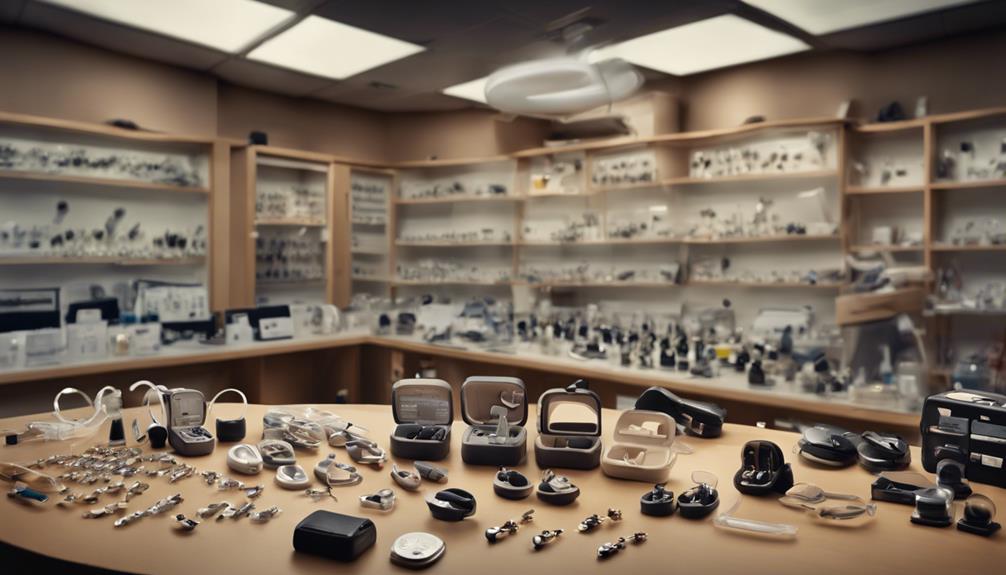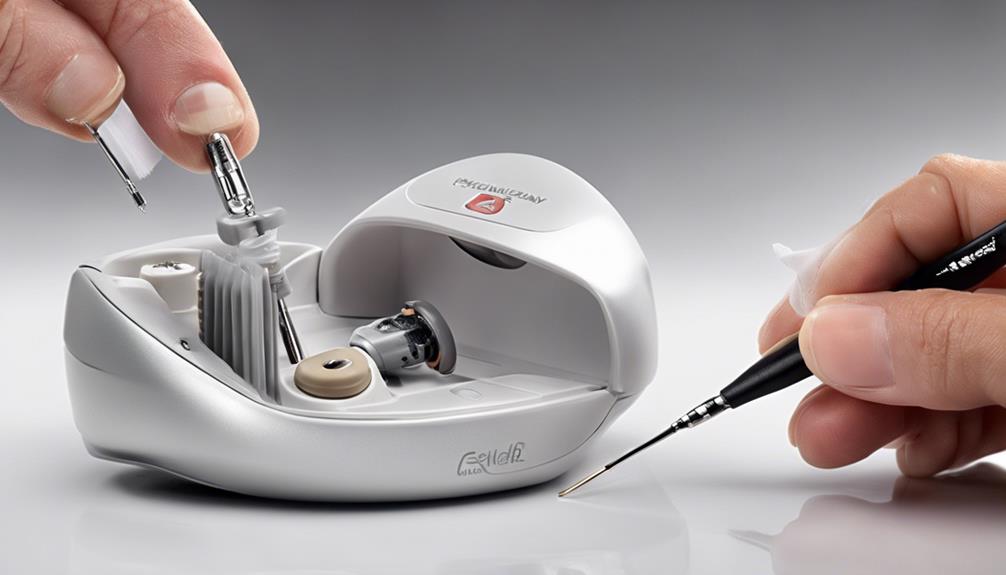As we explore the world of maintaining hearing aids, it’s interesting to highlight that about 15% of hearing aid problems can be fixed through basic troubleshooting at home.
However, when faced with more complex problems, seeking expert assistance becomes crucial.
But what steps should one take to find the nearest professional for hearing aid repair? Let's explore the systematic approach to locating reliable and efficient repair services nearby.
Key Takeaways
- Efficiently locate repair services through online directories or local clinics.
- Assess damage by examining for visible signs, testing sound quality, and checking functionality.
- Understand warranty coverage for repairs, replacements, and limitations.
- Seek professional assistance from audiologists for personalized repair services and optimal care.
Locating Nearby Hearing Aid Repair Services
When seeking out nearby hearing aid repair services, it's essential to leverage online directories or search engines to streamline the process efficiently. By typing in keywords like 'hearing aid repair' and your location, you can quickly find a list of options available in your area. Additionally, checking with local audiology clinics or hearing aid specialists can provide valuable insights into reputable repair services nearby. It's crucial to look for customer reviews or testimonials to gauge the quality of repair services offered and ensure you're entrusting your hearing aids to reliable professionals.
Consider contacting the manufacturer for repair options as well. They may have certified technicians or recommended repair centers that specialize in their specific brand. Inquire about the proximity of the repair service to ensure convenience and accessibility, especially if you might need to make multiple trips. Some repair services even offer loaner hearing aids while yours are being fixed, helping you stay connected to the sounds that matter most.
Assessing Your Hearing Aid Damage

To properly address any issues with your hearing aid, it's crucial to thoroughly assess the extent of the damage by examining for visible signs such as cracks, scratches, or missing parts. Look closely for any physical damage that may affect the functionality of your device.
Additionally, test your hearing aid for sound issues like distorted sound, feedback, or sudden changes in volume. These can indicate internal damage that needs repair. Check for moisture damage by inspecting the battery compartment and microphone ports for any signs of water or corrosion. Moisture can severely impact the performance of your hearing aid and lead to malfunctions.
Evaluate the functionality of your hearing aid by ensuring that all buttons, switches, and settings are working properly. Keeping a record of any issues or changes in performance will help your audiologist during the repair assessment process. By being thorough in your assessment, you can better understand the extent of the damage and what repairs are needed to restore your hearing aid to optimal function.
Understanding Your Warranty Coverage
We've encountered various warranty terms and coverage limitations in our experience with hearing aid repairs. Understanding these aspects is crucial for effectively utilizing the warranty benefits.
Let's break down the warranty terms and clarify any coverage limitations to navigate repair services seamlessly.
Warranty Terms Explained
Navigating the world of hearing aid warranties requires a keen eye for details and an understanding of what coverage entails. When it comes to warranty terms, it's essential to grasp the specifics to make the most of your coverage.
Here are some key points to consider:
- Coverage Duration: Most hearing aids come with a standard one or two-year warranty for repairs and replacements.
- Extended Options: Extended warranties can be purchased to provide additional coverage beyond the standard period.
- Manufacturer Defects: Warranty coverage typically includes issues arising from manufacturer defects.
- Exclusions: Be aware that accidental damage or misuse may not be covered under the warranty.
Understanding these terms will help you navigate the repair process with confidence and clarity.
Coverage Limitations Clarified
As we examine 'Coverage Limitations Clarified,' it's crucial to understand the specifics of your hearing aid warranty to make informed decisions about potential repairs and replacements.
When considering your warranty coverage, make sure to take your hearing aid repairs to authorized service centers recommended by the manufacturer. Different warranties may have limitations on the types of repairs covered or the timeframe in which repairs can be made at no additional cost.
It's essential to review the terms of your warranty carefully to avoid unexpected out-of-pocket expenses. If you have any doubts about what's included in your warranty coverage, don't hesitate to consult your audiologist or contact the manufacturer for clarification.
Understanding these limitations will help you navigate the repair process smoothly.
Consulting With an Audiologist

When consulting with an audiologist, we benefit from their specialized knowledge and expertise in hearing health care.
They conduct thorough evaluations to assess the condition of our hearing aids and collaborate with us to create a personalized treatment plan.
This collaboration ensures that our hearing aid problems are addressed effectively and that we receive tailored solutions for optimal performance.
Audiologist Expertise Importance
Drawing upon the expertise of an audiologist is essential for effectively diagnosing and resolving any complex or persistent issues with your hearing aids. Audiologists have undergone specialized training to accurately assess and repair hearing aid problems.
When consulting with an audiologist, you can benefit from personalized care and guidance tailored to optimize your hearing aid performance. Their professional assistance not only addresses current issues but also helps in maintaining the longevity and effectiveness of your devices.
By entrusting your hearing aid concerns to an audiologist, you ensure that you receive the highest standard of care for your hearing health needs.
- Specialized training for accurate assessments
- Personalized care and guidance for optimal performance
- Maintenance of longevity and effectiveness
- Highest standard of care for hearing health
Hearing Aid Evaluation Process
Entrusting our hearing health to the expertise of an audiologist ensures a thorough evaluation process tailored to our individual needs and lifestyle. The audiologist begins by assessing our hearing needs and lifestyle factors to recommend suitable hearing aid devices. This evaluation includes a comprehensive hearing test to precisely determine the extent of our hearing loss.
Factors such as communication preferences and daily activities are taken into consideration to customize the right solution for us. During the evaluation, our expectations, budget, and past experiences with hearing aids are discussed to inform the recommendations. Upon completion of the evaluation, the audiologist suggests specific hearing aid models that align with our unique requirements and preferences.
Treatment Plan Collaboration
In our collaborative efforts with audiologists, we ensure precise diagnosis and personalized treatment plans for the repair of hearing aids. When consulting with an audiologist, here are key aspects to consider:
- Expert Evaluation: Audiologists have the expertise to identify and address various issues with hearing aids effectively.
- Tailored Approach: Consulting with an audiologist is essential for determining the best repair approach based on the specific problem.
- Repair Guidance: Audiologists can provide insights on whether a repair can be done in-office or if manufacturer assistance is necessary.
- Personalized Care: Working closely with an audiologist ensures that the repair process is tailored to individual needs and preferences.
Exploring Loaner Hearing Aid Options

When exploring loaner hearing aid options, individuals can consult their audiologists to inquire about the availability of temporary devices for uninterrupted hearing assistance during repair periods. Loaner aids are a valuable solution to prevent disruptions in daily activities that rely on clear hearing.
These temporary devices offer a seamless transition, ensuring that individuals can maintain their normal functionality while their primary hearing aids are undergoing repair. The availability of loaner aids may vary depending on the audiologist's service offerings and current stock.
Professional Repair Process Explained

After exploring loaner hearing aid options to ensure uninterrupted hearing assistance, the professional repair process involves audiologists conducting a thorough inspection to pinpoint the root cause of any issues with the device.
Here's a breakdown of the steps involved in the expert repair process:
- Thorough Inspection: Audiologists carefully examine the hearing aid to identify any underlying problems affecting its functionality.
- Battery and Physical Damage Check: They assess the battery status and look for any physical damages that might be impacting the device's performance.
- Cleaning Procedures: Cleaning is performed to eliminate dirt, clogs, and the wax filter is checked for any blockages that could affect sound quality.
- Component Replacement and Internal Repairs: Damaged components are replaced, and internal parts are repaired as needed to restore the hearing aid to optimal working condition.
Ensuring Optimal Hearing Aid Functionality

To ensure optimal functionality of your hearing aid, meticulous maintenance routines are imperative for preserving its performance and longevity. Regular cleaning and upkeep play a crucial role in preventing issues that may affect your device's performance.
Professional assistance from audiologists is vital for diagnosing and effectively repairing complex problems that may arise. By adhering to the manufacturer's warranty guidelines, you can ensure that your hearing aid receives proper repair services when needed.
In instances where repairs are necessary, loaner hearing aid programs can provide temporary solutions to ensure you always have access to assistive devices. Personalized repair services in Houston offer dedicated support for any hearing aid issues you may encounter, providing tailored solutions to meet your specific needs.
Frequently Asked Questions
How Do You Fix a Hearing Aid?
When fixing a hearing aid, we first check the device status, battery, volume, and software settings for sound issues.
Address uncomfortable sounds by inspecting for battery corrosion, adjusting volume, and considering tinnitus.
Feedback problems like whistling may indicate physical damage requiring a clinic visit.
For custom fit, consult an audiologist if discomfort persists.
Professional help is crucial for complex issues, offering same-day repairs or replacements if necessary.
What Do I Do if My Hearing Aid Is Broken?
If our hearing aid is broken, we should first check the basics like the battery and physical condition. It's crucial to contact our audiologist or the manufacturer for repair guidance. Avoid DIY fixes to prevent further damage.
Seek professional assistance promptly to maintain optimal performance. Consider temporary loaner aids if needed until our device is repaired. Prioritize proper care to ensure the best outcome for our hearing aid.
How Would You Troubleshoot a Hearing Aid That Is Not Working?
If a hearing aid isn't working, we'd first check if it's turned on and the battery door is securely shut.
Testing the battery is crucial; replacing it if needed can fix power-related issues.
Inspecting for damage like corrosion or dirt is essential.
Correct volume settings are also key.
If these steps don't work, seeking help from an audiologist for a thorough diagnosis and repair is recommended.
How Do You Take Apart a Hearing Aid?
First, ensure the battery is removed from the hearing aid.
Use a small flathead screwdriver or a hearing aid tool to open the battery compartment.
Gently pry open the casing with caution, avoiding damage to internal components.
Seek guidance from a professional if unsure about disassembly.
Always handle the hearing aid with care and precision to prevent any mishaps during the process.
Can I Use the Same Repair Guide for NHS Hearing Aids as for Expert Near Me?
Yes, you can use the same repair guide for NHS hearing aids as for an expert near you. A complete guide to NHS hearing aids should cover common issues like battery replacement, cleaning, and troubleshooting. It’s important to follow the specific instructions provided by the NHS or a qualified professional.
Conclusion
Overall, seeking expert hearing aid repair near you is crucial for maintaining optimal functionality.
With personalized services in Houston, you can trust in the expertise of audiologists to assess, repair, and provide loaner options when needed.
Remember, the professionals in this field have a wealth of experience and knowledge to ensure your hearing aids are in top-notch condition.
So don't hesitate to reach out for help, as they can work miracles on your devices!











